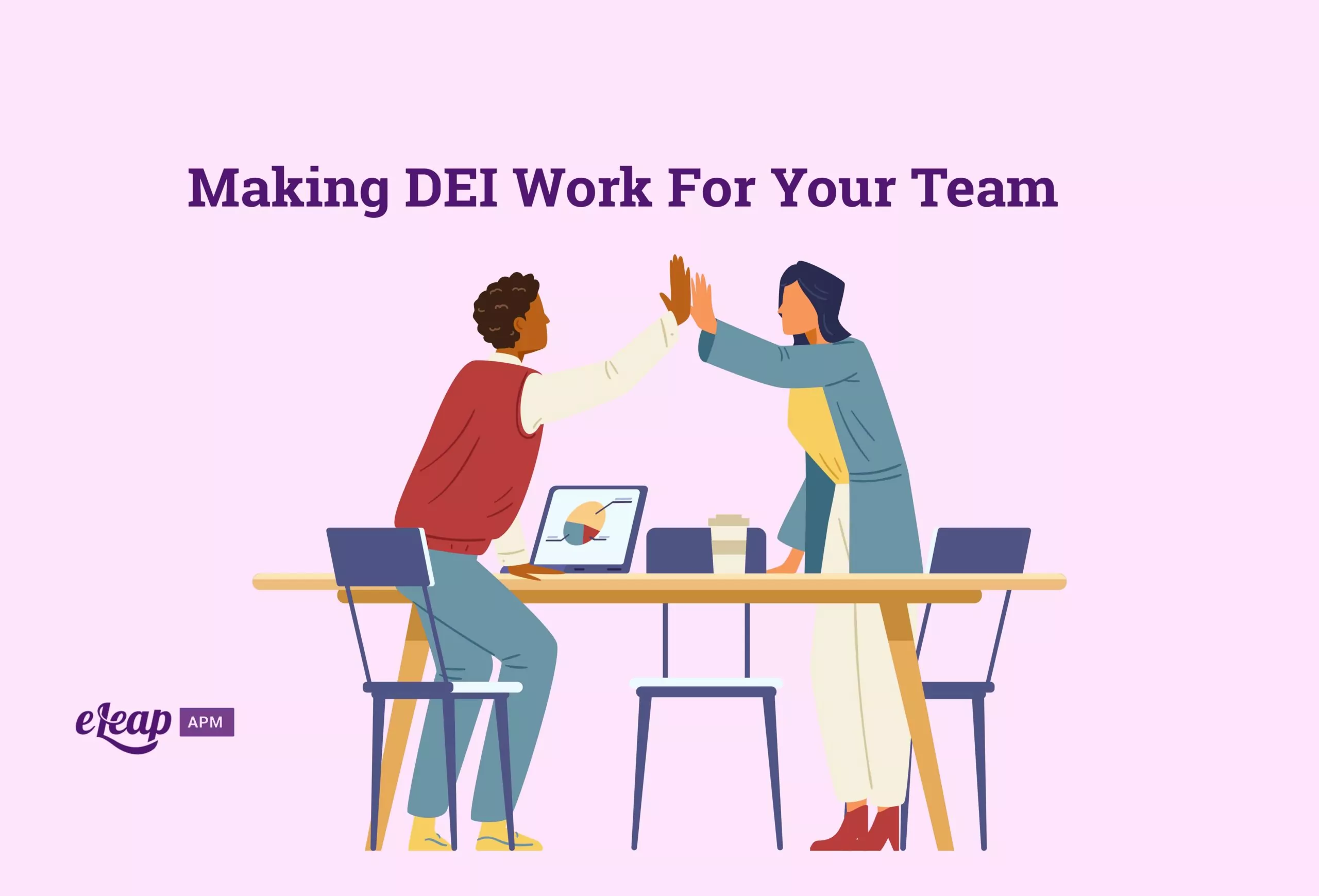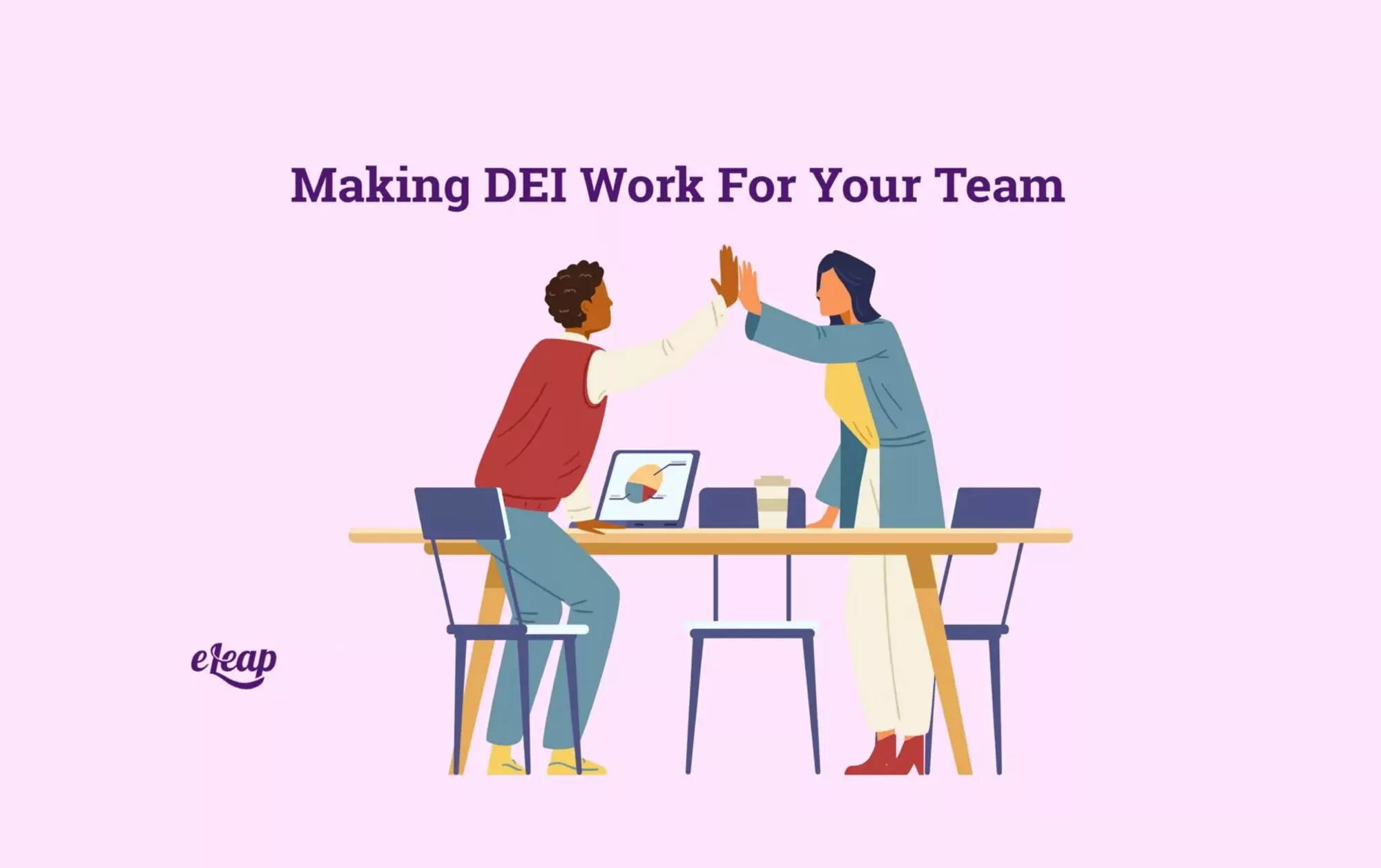Making DEI Work For Your Team

You can make DEI work for your team with just a few simple steps. What DEI is and why you should want to make it work will be discussed in detail in this article.
Diversity, equity, and inclusion (DEI) can seem like buzzwords that frequently require little more than a once-a-year training requirement in today’s work environment. However, the truth is that when you prioritize DEI, your entire organization benefits, even the bottom line.
While there isn’t a single set of guidelines for implementing a successful DEI program at your organization, you may start by knowing what DEI is and its benefits.
DEI Work – What Is Diversity and Why Does It Matter?
Diversity is the presence of differences within a particular setting. This typically refers to psychological, physical, and social disparities that can exist between any two people in the job. A group, society, or organization that is varied will have a range of social and cultural traits.

Five Advantages of Workplace Diversity – DEI Work Benefits
People from a variety of ages, races, ethnic backgrounds, languages, sexual orientations, physical and mental abilities, gender identities, and nationalities exist in diverse workplaces. You may improve how your business runs and attract more applicants by widening your hiring methods to bring in more people from different backgrounds.
Here are five important benefits of workplace diversity:
- More chances for imagination and problem-solving
A diverse workforce brings together a wide range of individuals with various experiences, skills, views, and ideas to address issues. Because teams of individuals from various backgrounds can draw on their own experiences, this provides a greater opportunity to spark novel and original ideas.
Diversity fosters innovation, creativity, and strategic thinking. Additionally, you can discover that professional collaboration is enhanced when coworkers can relate to one another more deeply based on their similar experiences or histories.
- Making wiser choices
Employee groups with a variety of backgrounds draw from a greater range of sources and experiences. That may enable them to make better selections, which will benefit your company. One study found that up to 87% of the time, diverse teams made better decisions than non-diverse teams.
Teams that exhibit diversity have exhibited smarter, more inventive, and more socially conscious progress and team bonding. These people have a reputation for processing information more thoroughly, which is important for coming to informed conclusions.
These are just a few of the diversity advantages your company will enjoy when you broaden your hiring procedures.
- An improvement in earnings and output
Professionals with ambition are frequently more drawn to inclusive businesses. This may lead to a more productive and motivated workforce as well as higher production and financial success. Fifty-five percent of job searchers feel it is very or extremely important to work for a firm that promotes diversity and inclusion, according to a survey conducted by Indeed.
In addition to increasing productivity, diverse teams are also more profitable for your business. According to one study, businesses with gender diversity on their executive teams are 15% more likely to achieve above-average profitability than businesses with executive teams largely made up of white men in the bottom quartile.
- Lower staff turnover rates
An important benefit of diversity in the workplace is that it frequently results in happier and more comfortable workers. Additionally, they tend to be more devoted and motivated to stay longer at organizations where their particular contributions are accepted and acknowledged.
Overall, workplace equality can boost self-esteem and motivate staff to reach their full potential. Diverse teams frequently have higher morale and are more successful, inventive, and devoted to the company.
- A better reputation for your company
Businesses are seen by more people as relatable, socially conscious, and human when they support diversity. This can enhance your brand’s reputation as a whole, enabling you to draw in new clients, collaborators, and markets.
Understanding the E in DEI Work
Access to equity ensures that everyone has the same possibilities for progress and treatment. Equity aims to find and remove obstacles that hinder some groups from fully participating.
It might be challenging to establish equity at work. This is because what constitutes fair and equal treatment is frequently arbitrary and specific to each employee’s circumstances.
However, by first acknowledging this reality, a business can demonstrate equity in the workplace. Building a comfortable environment that encourages open communication and understanding is the first step in fostering an egalitarian workplace. Making equity in the workplace a priority can be accomplished by incorporating the following:
Making DEI Work For Your Team, pay equity attention: Fair remuneration by salary transparency and open discussion of the relationships between employee performance, position, and pay rate should occur.
Ensure representation at all levels is varied: Many businesses try to hire diverse candidates but often don’t give them equal opportunities to progress. When this occurs, we observe a high degree of diversity in low-wage, low-authority positions and an overrepresentation of one demographic in leadership and management positions.
Your business should support diverse representation in leadership roles and empower diverse personnel by granting fair promotions.
Implement a program for workforce education: Access to education is restricted by systemic hurdles, particularly for Black, Indigenous, and People of Color (BIPOC) and people with disabilities. In many workplaces, the lack of access results in a significant lack of diversity.
Fair education is essential for ensuring future employment equity. By investing in a workforce education program, you may help underrepresented employees progress their careers and expand alongside your business. This could change their lives.
Inclusion Is the I in DEI Work
Making DEI Work For Your Team, the concept of inclusion describes how members of various social identities experience belonging to the broader group. It’s true that you can have a varied team of talented individuals, but that doesn’t automatically imply that everyone feels a feeling of belonging, welcome, or respect in all work environments.
Understanding and respect are the cornerstones of inclusion in the workplace. In order to create a more inclusive workplace where everyone feels valued, it is essential to make sure everyone’s ideas and opinions are heard and properly weighed.
It is exceedingly difficult to create a workplace where everyone feels accepted and participates in decision-making, and it requires ongoing support to succeed.
The Harvard Business Review claims that encouraging and assessing employee participation is very challenging. First, leadership needs to define “inclusion” comprehensively. Then, people and HR departments must routinely collect all employees’ input on their ongoing or proposed initiatives. A few actions should occur to successfully promote inclusion at work:
- Encourage leadership to receive training in active listening and unconscious prejudice.
- Create an inclusion council that actively participates in goal setting, hiring, and employee retention.
- Establish areas in your workplace that showcase your diversity. For instance, you might establish a prayer room for your employees to have a private place to practice their religions. You could create a mother’s room for nursing mothers to do so.
- Establish employee resource groups (ERGs) to provide workers with a secure setting for gathering and discussing shared interests. For instance, there are groups for new parents, LGBTQ+ people, and saleswomen.
These groups allow workers to come together and open up about their struggles in a non-judgmental environment. These groups can also serve as wonderful mentors for the other employees by holding company-wide discussions on subjects that are significant to them.
The Significance of Inclusion, Diversity, and Equity in DEI Work
Making DEI Work For Your Team, diversity, equity, and inclusion reinforce one another within an organization. Focusing only on diversity is insufficient because creating an inclusive and equitable workplace requires a strong commitment to employees’ experiences of inclusion and equity.
Organizations that don’t use DEI methods miss out on chances to maximize the potential of their workforce. They will struggle to compete with businesses that are focused on DEI. Without a three-prong focus, they seem out of alignment with current environments.
DEI Work Invested Organizations Have a Strong Framework
Making DEI Work For Your Team, when DEI projects are at the forefront, some advantages are apparent at every level of the business, not just employee morale. Building engaged and content employees require investing in DEI initiatives. Employees at companies with strong DEI initiatives are more likely to report higher work satisfaction, trust, and engagement levels.
Employees: Teams with at least one member representing their target’s gender, race, age, sexual orientation, or culture are 158% more likely to comprehend their target clients.
Managers: Companies with greater management diversity generated 38% more annual revenue than those with less diversity. This might be the case since innovation and diversity of gender, nationality, career route, and industry background are strongly associated.
Leaders: Businesses with executive leadership teams that are gender diverse are 21% more likely to be profitable and 27% better at adding value.
Summary – DEI Work Is Essential for Business Success
Making DEI Work For Your Team, without a good balance of diversity, equity, and inclusion, your business might not reach its potential. It’s essential to have a well-rounded team that works toward one goal. As businesses change their way of thinking toward this DEI work viewpoint, don’t get behind the curve. Look at your current workforce and take the steps you need to take for the health of your business.